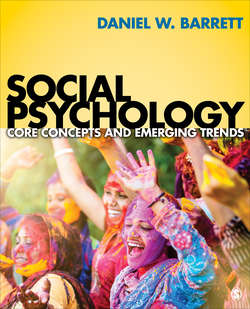Читать книгу Social Psychology - Daniel W. Barrett - Страница 153
На сайте Литреса книга снята с продажи.
Self-Discrepancy Theory and Possible Selves
ОглавлениеWhen you reflect on who you are, do you ever think about your possible selves, such as who you would like to be or what kind of a person you ought to be? Self-discrepancy theory postulates that each of us has an actual self, an ideal self, and an ought self (Hardin & Larsen, 2014; Higgins, 1989b, 1997; Stanley & Burrow, 2015). Our understanding of who we are is called our actual self and is closely tied to our self-concept. In addition, we can imagine the person we would like to be—called the ideal self—that consists of the qualities and features that we wish we had (Hardin & Larsen, 2014). Perhaps you work at Starbucks but would rather be interning at a local mental health center. When we feel a discrepancy such as this between our actual and ideal selves, we tend to feel frustrated, dissatisfied, or disappointed (Higgins, 1989).
People also have thoughts about who they think others think they should be—what is called the ought self. Your ought self comes into play, say, if your parents own the local hardware store and have been pressuring you to work there and eventually be the owner. You think that you ought to be following the career that your parents prefer, but you have elected to choose your own career path (see photos). Here you would experience an actual-ought discrepancy and may feel guilty, ashamed, or anxious (Higgins, 1989b). As you can see, discrepancies between the actual, ideal, and ought selves have important implications for how we evaluate or feel about ourselves, a theme we will return to later in this chapter in the context of self-esteem.
©iStockphoto.com/sturti.
Is, Ought, and Ideal Selves
Are you who your parents want you to be? Who you want to be? Perhaps you work in package delivery (is self), yet you want to be a basketball player (ideal self), and your parents want you to be a doctor (ought self).
©iStockphoto.com/annebaek.
©iStockphoto.com/Aksonov.
